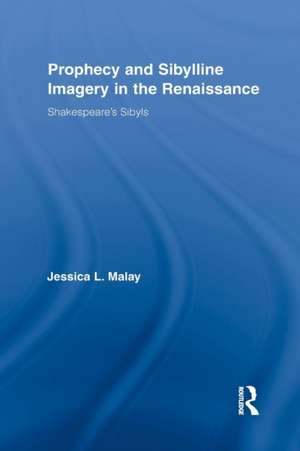Prophecy and Sibylline Imagery in the Renaissance: Shakespeare’s Sibyls: Routledge Studies in Renaissance Literature and Culture
Autor Jessica L. Malayen Limba Engleză Paperback – 23 apr 2015
| Toate formatele și edițiile | Preț | Express |
|---|---|---|
| Paperback (1) | 434.73 lei 43-57 zile | |
| Taylor & Francis – 23 apr 2015 | 434.73 lei 43-57 zile | |
| Hardback (1) | 1036.98 lei 43-57 zile | |
| Taylor & Francis – 7 apr 2010 | 1036.98 lei 43-57 zile |
Din seria Routledge Studies in Renaissance Literature and Culture
-
 Preț: 295.35 lei
Preț: 295.35 lei -
 Preț: 311.76 lei
Preț: 311.76 lei -
 Preț: 311.41 lei
Preț: 311.41 lei -
 Preț: 475.64 lei
Preț: 475.64 lei -
 Preț: 714.61 lei
Preț: 714.61 lei -
 Preț: 311.41 lei
Preț: 311.41 lei -
 Preț: 339.87 lei
Preț: 339.87 lei -
 Preț: 444.00 lei
Preț: 444.00 lei - 18%
 Preț: 1031.81 lei
Preț: 1031.81 lei - 26%
 Preț: 846.42 lei
Preț: 846.42 lei -
 Preț: 277.20 lei
Preț: 277.20 lei - 18%
 Preț: 1086.70 lei
Preț: 1086.70 lei -
 Preț: 381.57 lei
Preț: 381.57 lei - 18%
 Preț: 1031.81 lei
Preț: 1031.81 lei - 26%
 Preț: 762.59 lei
Preț: 762.59 lei -
 Preț: 431.91 lei
Preț: 431.91 lei - 18%
 Preț: 981.60 lei
Preț: 981.60 lei - 26%
 Preț: 763.43 lei
Preț: 763.43 lei - 13%
 Preț: 320.58 lei
Preț: 320.58 lei - 26%
 Preț: 763.82 lei
Preț: 763.82 lei - 18%
 Preț: 1035.66 lei
Preț: 1035.66 lei - 18%
 Preț: 1039.72 lei
Preț: 1039.72 lei - 18%
 Preț: 1115.56 lei
Preț: 1115.56 lei -
 Preț: 380.07 lei
Preț: 380.07 lei - 18%
 Preț: 1032.56 lei
Preț: 1032.56 lei -
 Preț: 483.86 lei
Preț: 483.86 lei -
 Preț: 424.55 lei
Preț: 424.55 lei - 18%
 Preț: 1040.74 lei
Preț: 1040.74 lei - 18%
 Preț: 1093.07 lei
Preț: 1093.07 lei - 18%
 Preț: 1084.38 lei
Preț: 1084.38 lei - 26%
 Preț: 761.39 lei
Preț: 761.39 lei -
 Preț: 407.85 lei
Preț: 407.85 lei - 18%
 Preț: 1089.01 lei
Preț: 1089.01 lei - 18%
 Preț: 1019.26 lei
Preț: 1019.26 lei - 18%
 Preț: 980.00 lei
Preț: 980.00 lei - 26%
 Preț: 846.42 lei
Preț: 846.42 lei - 26%
 Preț: 848.17 lei
Preț: 848.17 lei - 18%
 Preț: 1034.12 lei
Preț: 1034.12 lei
Preț: 434.73 lei
Nou
Puncte Express: 652
Preț estimativ în valută:
83.20€ • 86.42$ • 69.11£
83.20€ • 86.42$ • 69.11£
Carte tipărită la comandă
Livrare economică 03-17 februarie 25
Preluare comenzi: 021 569.72.76
Specificații
ISBN-13: 9781138868878
ISBN-10: 1138868876
Pagini: 216
Dimensiuni: 152 x 229 x 12 mm
Greutate: 0.32 kg
Ediția:1
Editura: Taylor & Francis
Colecția Routledge
Seria Routledge Studies in Renaissance Literature and Culture
Locul publicării:Oxford, United Kingdom
ISBN-10: 1138868876
Pagini: 216
Dimensiuni: 152 x 229 x 12 mm
Greutate: 0.32 kg
Ediția:1
Editura: Taylor & Francis
Colecția Routledge
Seria Routledge Studies in Renaissance Literature and Culture
Locul publicării:Oxford, United Kingdom
Public țintă
Postgraduate and UndergraduateCuprins
List of Figures Editorial Note Acknowledgments Introduction 1: Sibylline Heritage: From the Mists of Antiquity 2: Reforming the Sibyl: The Appropriation of the Sibyls in the Middle Ages and Reformation 3: The Sibyls in Elizabeth’s Court and Country 4: The Sibyls: God’s Divines or She Imps of Satan? 5: Shakespeare’s Sibyls 6: To be a Sibyl: Jane Seager’s Sibylline Poems 7: The Final Act: Revealing the Sibyls in Jacobean England Notes Bibliography Index
Descriere
This book restores the rich tradition of the Sibyls to the position of prominence they once held in the culture and society of the English Renaissance. The sibyls -- figures from classical antiquity -- played important roles in literature, scholarship and art of the period, exerting a powerful authority due to their centuries-old connection to prophetic declamations of the coming of Christ and the Apocalypse. The identity of the sibyls, however, was not limited to this particular aspect of their fame, but contained a fluid multi-layering of meanings given their prominence in ancient Greek and Roman cultures, as well as the widespread dissemination of prophecies attributed the sibyls that circulated through the oral tradition. Sibylline prophecy of the Middle Ages served as another conduit through which sibylline authority, fame, and familiarity was transmitted and enhanced. Writers as disparate as John Foxe, John Dee, Thomas Churchyard, John Fletcher, Thomas Heywood, Jane Seager, John Lyly, An Collins, William Shakespeare, and many others draw upon this shared sibylline tradition to produce particular and specific meanings in their writing. This book explores the many identities, the many faces, of the prophetic sibyls as they appear in the works of English Renaissance writers.
